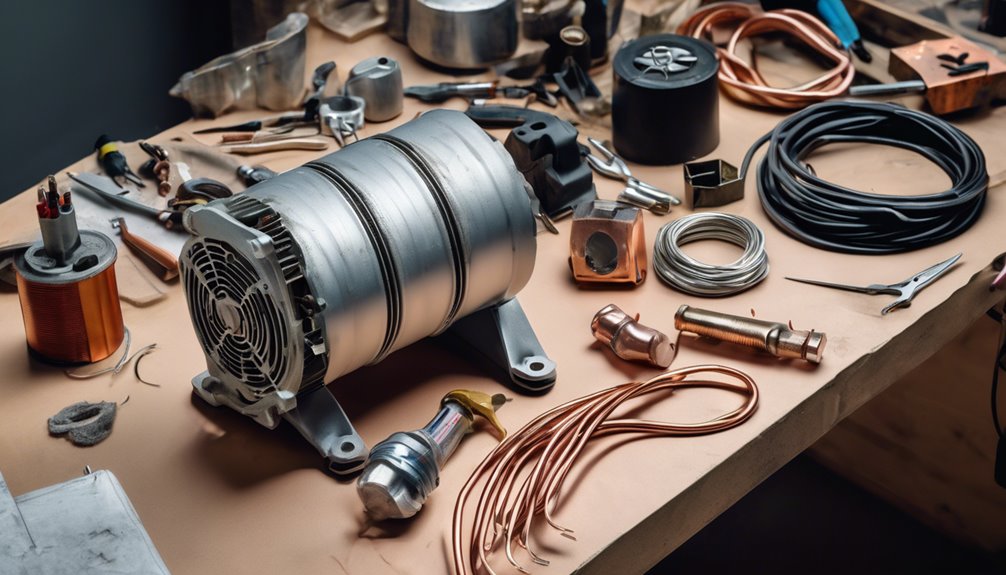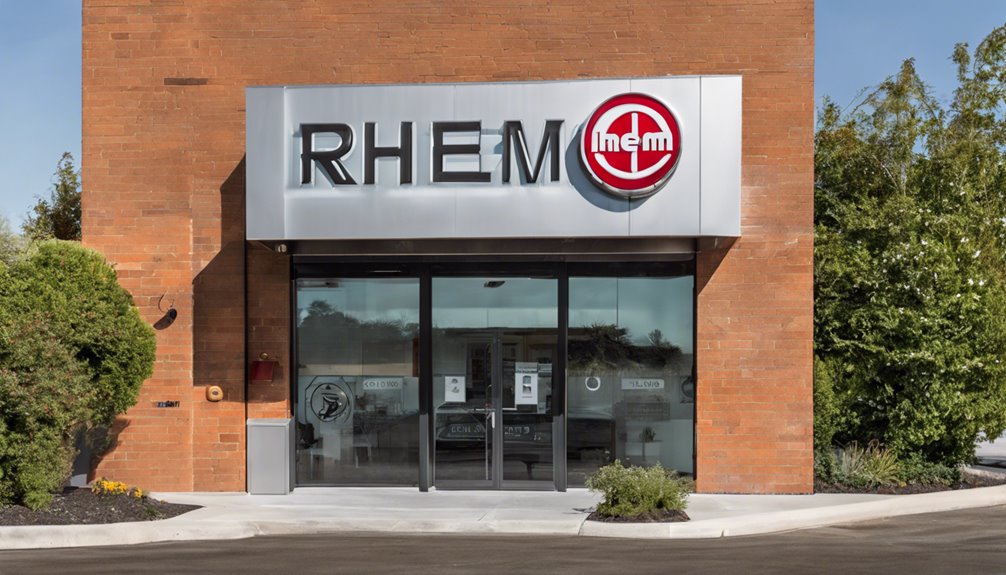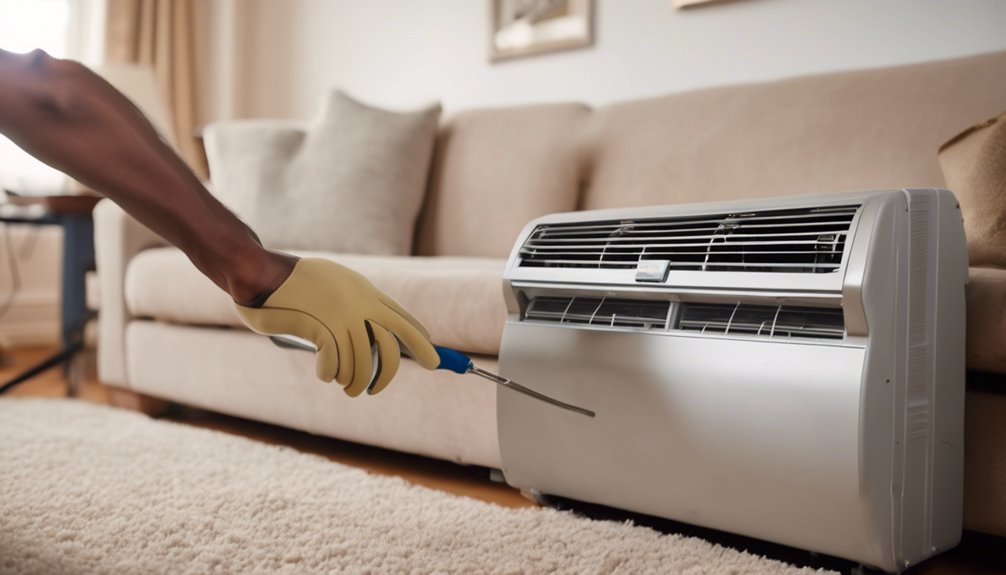You're wondering if your AC compressor can be repaired? The good news is that it's often possible to fix or replace specific components rather than the entire compressor, saving you time and money. By diagnosing the problem, you can identify the root cause of the issue and determine if repair is an option. If you're not sure where to start, don't worry – we'll walk you through the process and help you figure out the best course of action to get your AC up and running smoothly again.
Key Takeaways
- Yes, some AC compressor issues can be repaired, such as refrigerant leaks and faulty capacitors, by identifying and fixing the root cause.
- Repairing a compressor involves a thorough system inspection, diagnosis, and replacement of faulty components to prevent future leaks.
- However, if the compressor is old or has worn bearings, replacement may be the more cost-effective and efficient option in the long run.
- Repair attempts may not always be successful, and if the compressor continues to malfunction, replacement is often the best solution.
- Regular maintenance and tune-ups can help prevent compressor failure by identifying potential issues before they become major problems.
Diagnosing the Problem
When your AC compressor breaks down, diagnosing the problem quickly is crucial to minimizing downtime and preventing further damage.
You'll want to start by performing a thorough compressor inspection to identify any visible signs of wear or failure. This includes checking for refrigerant leaks, corrosion, or electrical issues.
Next, conduct a system analysis to determine how the compressor's failure is affecting the entire air conditioning system. This may involve reviewing system pressure readings, temperature levels, and electrical currents.
Common Causes of Compressor Failure
When you're troubleshooting your AC compressor, you'll likely find that one of three common issues is to blame:
Refrigerant leaks, electrical problems, or mechanical failure. These failures can occur suddenly or develop over time, but they all have one thing in common – they can bring your cooling system to a grinding halt.
Refrigerant Leaks Occur
Refrigerant leaks are one of the most common causes of compressor failure, and they can occur due to various reasons.
If you suspect a refrigerant leak, it's essential to act quickly to prevent further damage. You'll need to perform a leak inspection to identify the source of the leak.
This involves using specialized equipment for refrigerant detection, such as ultraviolet dye or electronic leak detectors. Once you've located the leak, you can begin repairs.
Be cautious when handling refrigerant, as it can be hazardous to your health and the environment. Remember to always follow safety guidelines and protocols when dealing with refrigerant leaks.
Electrical Issues Arise
Electrical issues are another common culprit behind AC compressor failure.
You might be surprised to know that a faulty electrical system can cause your AC compressor to malfunction or even fail. When power surges or wiring faults occur, they can damage the compressor's electrical components, leading to failure.
Three common electrical issues that can cause compressor failure are:
- Power surges: A sudden spike in voltage can damage the compressor's electrical components, causing them to fail.
- Wiring faults: Loose or corroded wires can disrupt the electrical supply to the compressor, leading to malfunction or failure.
- Electrical overload: When the compressor is overloaded, it can cause the electrical components to overheat, leading to failure.
Mechanical Failure Happens
Most AC compressors will experience mechanical failure at some point, and it's often due to preventable causes.
You might be surprised to learn that worn bearings are a common culprit. Over time, they can seize up, causing the compressor to fail.
Another issue you might encounter is corroded coils. When moisture accumulates on the coils, it can lead to corrosion, reducing the compressor's efficiency and eventually causing it to break down.
You can prevent these issues by regularly maintaining your AC unit, ensuring proper airflow, and keeping the coils clean. By taking these steps, you can extend the life of your compressor and avoid costly repairs.
Repairable Compressor Issues
When you're dealing with a faulty AC compressor, you'll be relieved to know that some issues can be repaired.
You might be able to fix a leak in the refrigerant system or replace a faulty capacitor, getting your compressor up and running again.
Leaking Refrigerant Fix
A few ounces of refrigerant can make all the difference in your AC's performance, but a leak can quickly drain your system and render your compressor useless.
If you suspect a refrigerant leak, it's crucial to act fast to prevent further damage.
You'll need to:
- Perform a refrigerant test to identify the source of the leak.
- Conduct a thorough system inspection to locate any signs of damage or corrosion.
- Repair or replace the faulty components to prevent future leaks.
Faulty Capacitor Replacement
You've identified refrigerant leaks and addressed them, but your AC compressor still isn't running smoothly. A faulty capacitor could be the culprit. Capacitor testing can help you identify the issue. If the capacitor is faulty, replacement is often a straightforward process. However, before replacing the capacitor, try capacitor cleaning to see if that resolves the issue.
| Symptom | Solution |
|---|---|
| Compressor won't start | Check capacitor for signs of wear or damage |
| Compressor is noisy | Clean the capacitor and check for proper connections |
| Compressor is overheating | Replace the capacitor with a new one of the same specifications |
| Compressor is vibrating excessively | Ensure proper capacitor installation and secure connections |
When Replacement Is the Only Option
Since your AC compressor has already shown signs of wear and tear, it's likely that repair attempts have been made to salvage it.
However, if you've reached a point where the compressor is still malfunctioning, it might be time to consider replacement.
1. Old components are beyond repair**: If the compressor's internal components, like valves or pistons, are worn out or damaged beyond repair, it's more cost-effective** to replace the entire unit.
2. You've noticed worn bearings: Worn-out bearings can cause the compressor to vibrate excessively, leading to further damage.
In this case, replacing the bearings mightn't be enough, and a new compressor might be necessary.
3. The compressor is no longer energy-efficient****: If the compressor's energy efficiency has significantly decreased, it might be more cost-effective to replace it with a newer, more energy-efficient model.
DIY Repair vs. Professional Help
Your AC compressor is on the verge of replacement, but before calling a professional, you might be wondering if DIY repair is a viable option.
While attempting to fix it yourself may seem like a cost-effective solution, you should consider the warranty implications. If your compressor is still under warranty, DIY repairs may void it, leaving you with a costly replacement bill.
On the other hand, hiring a professional may cost more upfront, but it ensures the repair is done correctly, and your warranty remains intact.
Weighing cost considerations against the potential risks, it's crucial to decide whether to take the DIY route or seek professional help.
Preventing Future Compressor Failure
By taking proactive measures, you can significantly reduce the likelihood of your AC compressor failing again in the future.
Regular maintenance is key to preventing future compressor failure.
Here's what you can do:
- Schedule regular tune-ups: Having your AC unit serviced regularly can help identify potential issues before they become major problems.
- Keep your AC unit clean: Make sure to clean your AC unit regularly to prevent dirt and debris from accumulating and causing damage.
- Monitor your AC's performance: Keep an eye on your AC's performance and address any issues promptly to prevent minor problems from becoming major ones.
Frequently Asked Questions
Can I Repair an AC Compressor Myself if I'm Not a Professional?
You're considering DIY AC compressor repair, but beware of DIY risks and amateur mistakes that can lead to further damage, safety hazards, and costly rework – it's often better to leave it to a pro to ensure a safe and efficient fix.
How Long Does a Repaired AC Compressor Typically Last?
You're wondering how long a repaired AC compressor will last. Typically, a repaired compressor's average lifespan is around 5-7 years, but its reliability expectations vary depending on the quality of the repair, maintenance, and usage.
Will a Repaired Compressor Affect My Ac's Energy Efficiency?
You're wondering if a repaired compressor will impact your AC's energy efficiency. The answer is yes, it might; a repaired compressor may not perform as optimally as a new one, affecting energy savings and performance metrics, potentially increasing your utility bills.
Can a Repaired Compressor Be as Good as a New One?
You're wondering if a repaired compressor can match a new one's quality. In most cases, a rebuilt compressor can offer reliable performance, but it's unlikely to regain its original performance; it'll still work, but might not be as efficient or durable as a brand-new unit.
Are There Any Warranties for Repaired AC Compressors?
You'll find that some repair shops offer warranties for repaired AC compressors, typically ranging from 30 days to a year. Look for repair options that include extended protection, giving you peace of mind and financial security in case the compressor fails again.
Conclusion
So, can an AC compressor be repaired? The answer is, it depends. If you've diagnosed the problem correctly and it's a repairable issue, you might be able to fix it yourself or with a professional's help. However, if the problem is more serious, replacement might be your only option. Either way, taking preventative measures can help extend the life of your compressor and avoid future failures.



